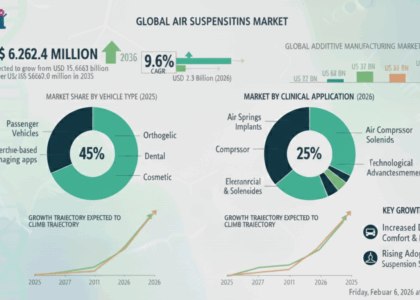
A marine fuel filter is a device that separates impurities and contaminants from fuel before it is used within the engine. The 2025 market is estimated to be worth USD 1,100.4 million, and it is expected to reach USD 1,613.2 million by 2035, with a CAGR of 3.9% during the forecast period. Increasing emphasis on engine efficiency, emission regulations, and the rising global fleet of recreational, commercial, and military vessels are driving the demand for advanced marine fuel filtration systems. As maritime operators focus more heavily on fuel quality to protect their investments and comply with international environmental standards, the marine fuel filter market is poised for steady growth throughout the next decade.
Get Ahead with Our Report: Request Your Sample Now!
https://www.futuremarketinsights.com/report-sample#5245502d47422d3130353233
Key Takeaways:
The marine fuel filter market is on a strong upward trajectory, fueled by the increasing need for cleaner combustion processes and prolonged engine life. The rise in demand for reliable fuel management solutions, especially amid the tightening of environmental regulations such as IMO 2020, is significantly boosting market growth. Vessel operators across both commercial and leisure sectors are prioritizing fuel filtration upgrades to reduce engine wear and improve fuel efficiency. Furthermore, technological advancements, such as multi-stage filtration systems capable of removing fine particulates and water contamination, are enhancing product performance and stimulating further market adoption. The growing trend of vessel electrification and hybrid propulsion, while still emerging, is also encouraging the use of highly specialized filtration systems tailored for complex marine fuel setups.
Emerging Trends in the Global Market:
The marine fuel filter market is witnessing several notable trends that are reshaping the competitive landscape. One major trend is the increasing integration of smart monitoring technologies that alert users about clogging, filter health, and maintenance needs in real time. These digital enhancements help prevent unplanned engine failures and optimize maintenance schedules. Another important trend is the growing preference for eco-friendly and reusable fuel filters, aligning with global sustainability goals and reducing operational costs over the vessel’s lifespan. Additionally, manufacturers are focusing on developing high-capacity, corrosion-resistant filters that can withstand harsh marine environments, particularly for offshore and long-haul applications. Modular and easy-to-install fuel filter designs are also gaining traction, offering shipbuilders and retrofitting projects a more flexible and cost-efficient solution.
Significant Developments in the Global Sector: Trends and Opportunities in the Market:
The global marine sector is evolving quickly, and so is the demand for innovative marine fuel filters. Key developments include a shift toward low-sulfur and alternative marine fuels, which present new challenges for filtration systems due to their different chemical properties. This trend offers significant opportunities for companies that can provide specialized filtration solutions capable of handling these fuels without compromising engine integrity. Another development is the rising investment in advanced shipbuilding activities across Asia-Pacific and Europe, where enhanced fuel management is increasingly considered an integral part of vessel design. Opportunities are expanding for aftermarket services, as ship owners seek to optimize their fleets through retrofitting with high-performance fuel filtration systems to meet modern compliance and efficiency standards. Furthermore, the expansion of autonomous and remotely operated vessels creates new filtration system requirements, offering manufacturers an exciting niche market to target.
Recent Developments in the Market:
Recent developments in the marine fuel filter market highlight the sector’s dynamic progression toward innovation and environmental responsibility. Companies have introduced new filter media technologies that offer enhanced particle retention rates while maintaining high flow capacity, supporting the latest high-pressure fuel injection systems used in modern marine engines. Strategic partnerships between fuel filter manufacturers and marine engine OEMs have intensified, focusing on the co-development of integrated filtration solutions that optimize engine performance and service life. Furthermore, leading brands are investing in sustainability-focused R&D initiatives, launching products made from recyclable materials and designed for longer operational lifecycles to minimize waste. Geographic expansion strategies are also in focus, with many companies establishing service hubs closer to major ports and shipyards to ensure faster support and supply chain reliability.
Thorough Market Evaluation: Full Report
https://www.futuremarketinsights.com/reports/marine-fuel-filter-market
Competition Outlook:
The marine fuel filter market is moderately competitive, with a mix of global leaders and specialized regional players. Innovation, durability, and regulatory compliance are key differentiators among competitors. Prominent players shaping the market landscape include Parker Hannifin Corporation, Donaldson Company, Inc., Mahle GmbH, Denso Corporation, Mann+Hummel Group, Cummins Inc., Baldwin Filters, Seaboard Marine, Racor Division, and Caterpillar Inc. These companies are actively investing in product development, strategic mergers and acquisitions, and partnerships to strengthen their position and tap into emerging markets.
Key Segmentations:
By type, the market is segmented into primary fuel filters, secondary fuel filters, and water separators. Primary fuel filters are experiencing the highest demand, as they play a crucial role in removing large contaminants and water content before fuel reaches the engine. Secondary fuel filters, which provide fine filtration to protect sensitive engine components, are also witnessing growing adoption due to increasingly stringent fuel purity requirements. By vessel type, the market is divided into commercial vessels, recreational boats, military vessels, and others. Commercial vessels account for the largest share, supported by the global growth in cargo shipping, offshore activities, and passenger transport. By region, the market is segmented into North America, Europe, Asia-Pacific, Latin America, and Middle East & Africa. Asia-Pacific is expected to dominate market growth during the forecast period, driven by strong shipbuilding activities, increasing marine trade, and supportive government policies promoting marine environmental protection.
About Future Market Insights (FMI)
Future Market Insights, Inc. (ESOMAR certified, recipient of the Stevie Award, and a member of the Greater New York Chamber of Commerce) offers profound insights into the driving factors that are boosting demand in the market. FMI stands as the leading global provider of market intelligence, advisory services, consulting, and events for the Packaging, Food and Beverage, Consumer Technology, Healthcare, Industrial, and Chemicals markets. With a vast team of 400 analysts worldwide, FMI provides global, regional, and local expertise on diverse domains and industry trends across more than 110 countries.
Contact Us:
Future Market Insights Inc.
Christiana Corporate, 200 Continental Drive,
Suite 401, Newark, Delaware – 19713, USA
T: +1-845-579-5705
For Sales Enquiries: sales@futuremarketinsights.com
Website: https://www.futuremarketinsights.com
LinkedIn| Twitter| Blogs | YouTube




